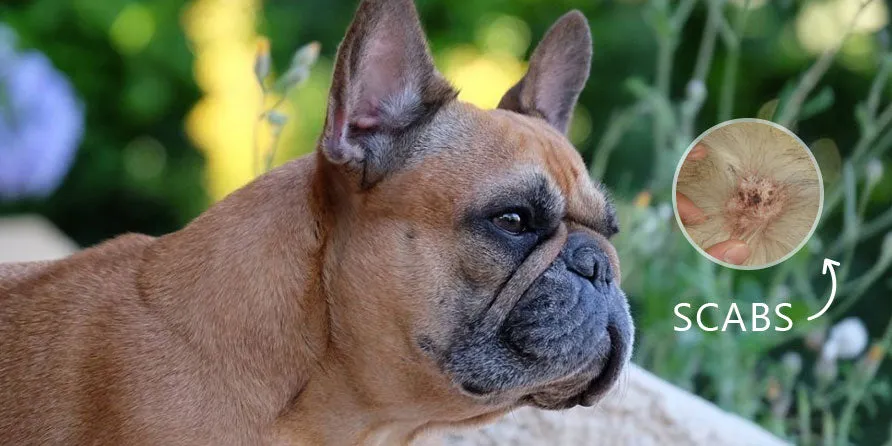Crusty scabs on your dog’s back can be distressing for both you and your furry friend. These scabs can lead to excessive scratching and licking, potentially worsening the condition and introducing bacteria that cause infection. Understanding the causes, types, and treatment options is crucial for your dog’s comfort and health. This article explores the various reasons for crusty scabs, effective home remedies, and preventative measures to keep your dog’s skin healthy.
 Dog with crusty scabs on its back, a common skin issue that can be addressed with proper care.
Dog with crusty scabs on its back, a common skin issue that can be addressed with proper care.
Why Does My Dog Have Crusty Scabs?
Several factors can contribute to crusty scabs on a dog’s skin. Identifying the underlying cause is the first step towards effective treatment. Here are some common reasons:
1. Allergies
Dogs, like humans, can develop allergies to various substances. When a dog’s body reacts to an allergen, it often results in itchy and inflamed skin, which can lead to scabs from scratching and licking.
- Food Sensitivities: Certain ingredients in your dog’s food may cause allergic reactions. A vet might recommend an elimination diet to identify the culprit. According to VCA Animal Hospitals, food allergies in dogs often manifest as chronic skin problems.
- Environmental Triggers: Pollen, fertilizers, pesticides, and even certain shampoos can irritate your dog’s skin. Secondhand smoke and personal care products can also trigger reactions upon contact.
- Medications or Treats: In some cases, a specific medication or treat can cause an allergic response.
The American Kennel Club notes that allergies are among the most common causes of itching and skin irritation in dogs, affecting 10–30% of the canine population.
2. Parasites
Parasites are a frequent cause of scabs in dogs. Regular parasite prevention is crucial for maintaining your dog’s skin health.
- Fleas: Flea bites can cause significant irritation due to the saliva and feces they leave behind. Constant scratching can lead to open sores that scab over. Fleas can also transmit bacteria, leading to infections.
- Ticks: These pests attach to your dog’s skin and feed on blood. The bite can cause irritation and scabbing. Ticks can also transmit serious diseases like Lyme disease. Ensure the entire tick, including the head, is removed to prevent infection.
- Mites (Mange): All dogs have mites on their skin, but an overpopulation can lead to mange.
- Sarcoptic mange (scabies mites) is highly contagious and causes intense itching.
- Demodectic mange (demodex mites) is usually not contagious but can cause irritation, hair loss, and scabs.
3. Infections
Scabs can also result from infections, regardless of allergies or parasites.
- Bacterial Infections: Folliculitis, an inflammation of hair follicles, can cause red bumps or sores that scab over.
- Fungal Infections (Ringworm): Despite its name, ringworm is a fungus that causes round bald spots, flaky or crusty skin, and redness. Ringworm is contagious to humans, so handle your dog with care if you suspect this infection.
- Yeast Infections: Yeast thrives in warm, moist areas like ears, armpits, or skin folds. Overgrowth can cause itchy, discolored, and scabby skin.
Most infections respond well to veterinary medication, especially when detected early.
4. Other Possible Reasons
Various other underlying issues can lead to scabs:
- Hormonal Imbalances: Conditions affecting hormone levels can alter oil production, leading to dry or irritated skin.
- Nutritional Deficiencies: Skin health depends on a balanced diet with adequate vitamins and minerals. Deficiencies can cause flaky, scabby skin.
- Seborrheic Dermatitis (Seborrhea): This condition causes greasy buildup or dandruff-like flakes, leading to itchy patches and scabs.
- Malassezia Dermatitis: A yeast-related condition often found around the ears, mouth, groin, or skin folds.
- Immune Disorders: Rarely, scabs can be linked to immune system issues, making it difficult for the dog to fight infections or causing the body to attack its own skin.
What are the Different Types of Scabs?
Different types of scabs can indicate various underlying conditions. Identifying the type of scab can help in determining the cause and appropriate treatment.
1. Dry, Flaky Scabs
These appear as rough, dry patches resembling hardened dandruff. They may start small but can spread if untreated.
- Possible Causes: Allergies, dry skin, seborrheic dermatitis, or nutritional deficiencies.
- Location: Back, belly, or around the tail.
2. Moist or Oozing Scabs (Hot Spots)
Also known as hot spots, these scabs start as red, inflamed areas that may ooze or feel sticky before forming a thick crust.
- Possible Causes: Flea bites, seasonal allergies, or excessive licking and scratching.
- Location: Neck, chest, hips, and legs.
3. Raised, Bumpy Scabs
These feel like small bumps or pimples under the fur.
- Possible Causes: Bacterial infections like folliculitis, insect bites, or immune system issues.
- Location: Back and sides, but can appear anywhere.
4. Circular, Crusty Lesions
These are easily recognizable as round patches of missing hair with crusty or scaly edges.
- Possible Causes: Fungal infections such as ringworm.
- Location: Face, ears, paws, and legs.
5. Thick, Yellow or Brown Scabs
These scabs are larger and thicker, often with a yellowish or brown color, and may contain pus underneath.
- Possible Causes: Secondary bacterial infections, untreated wounds, or severe flea infestations.
- Location: Areas frequently scratched or bitten.
6. Scabs with Hair Loss
When scabs are accompanied by bald spots or thinning hair, it indicates a deeper issue.
- Possible Causes: Mange (mites), fungal infections, or autoimmune conditions.
- Location: Ears, elbows, groin, or skin folds.
7. Greasy or Waxy Scabs
These feel oily or greasy to the touch and may have a waxy buildup.
- Possible Causes: Skin conditions like seborrheic dermatitis or yeast infections (Malassezia).
- Location: Back, around the ears, or in skin folds.
When to worry about scabs on your dog? Occasional small scabs may not be concerning, but if your dog is constantly scratching, losing hair, or if the scabs are spreading, consult your vet.
What are the Treatment Options for Scabs on Your Dog’s Skin?
 A vet examining a dog, emphasizing the importance of professional diagnosis for skin conditions.
A vet examining a dog, emphasizing the importance of professional diagnosis for skin conditions.
Treatment for scabs depends on the underlying cause. Consult your veterinarian for a proper diagnosis and treatment plan, which may include dietary changes, medications, or safe at-home remedies.
Dietary Adjustments
Food sensitivities or nutritional deficiencies can lead to skin problems. Your vet may recommend switching to a specialized diet or adding supplements rich in healthy oils. Plant-based dog food like Wild Earth can be beneficial for dogs with sensitive skin, as it avoids common allergens like chicken, meat, and dairy.
Additionally, eliminate potential environmental irritants such as certain shampoos, cleaning agents, or fragrances.
Medications
For infections or severe cases, your vet may prescribe topical creams or oral medications to target bacterial, fungal, or yeast infections. Always follow your vet’s instructions closely when administering medication.
Gentle Home Remedies
Safe, natural remedies can provide relief during flare-ups:
- Coconut Oil: With antifungal and antibacterial properties, coconut oil can soothe inflamed, itchy skin. Apply it directly to affected areas or, with your vet’s approval, add it to your dog’s diet.
- Oatmeal: Known for its anti-inflammatory benefits, oatmeal can be used in baths or poultices to reduce irritation.
- Chamomile Spray: Brew chamomile tea, cool it, and pour it into a spray bottle. Spray directly on irritated skin to ease redness and itching.
How to Clean Dog Scabs
Keeping the area clean is essential for healing. Here’s a gentle method for cleaning dog scabs at home:
- Start with Clean Hands: Wash your hands thoroughly before and after touching the scab to prevent spreading bacteria.
- Trim the Fur: Carefully trim long hair covering the area to allow air to reach the skin and facilitate cleaning.
- Use Warm Water and a Mild Solution: Use a vet-approved antiseptic rinse, saline solution, or diluted chlorhexidine. Avoid harsh soaps or hydrogen peroxide, as they can irritate the skin.
- Be Gentle: Dab the area with a damp cloth or gauze pad instead of scrubbing. Never pick at or peel the scab, as this can reopen the wound and slow healing.
- Dry the Area Well: Use a clean towel or gauze to remove any moisture, as dampness can worsen the condition.
- Soothe the Skin: If your vet recommends it, apply a safe antibacterial ointment, coconut oil, or medicated cream.
- Prevent Scratching: Use an Elizabethan collar (cone) or recovery sleeve to protect the area if your dog keeps licking or scratching.
How to Prevent Scabs on Your Dog’s Skin?
 A happy, healthy dog enjoying the outdoors, emphasizing the benefits of preventative care for long-term well-being.
A happy, healthy dog enjoying the outdoors, emphasizing the benefits of preventative care for long-term well-being.
Preventative treatment is essential for your dog’s long-term health. Regular wellness visits and consistent flea, tick, and parasite control are crucial. Educate yourself on dealing with common parasites, such as how to remove a tick properly.
Knowing your dog inside and out is key to preventing scabs. Pay close attention to any changes in your pet’s mental or physical state. Early identification of issues will help you ensure your pet’s well-being.
Final Verdict
Finding scabs on your dog can be concerning, but the cause is often treatable with early attention. Consult your vet if the scabs are spreading, causing hair loss, or making your dog uncomfortable. With the right care plan, including diet changes, medication, or home remedies, you can help your dog feel more comfortable and heal faster. Regular checkups, parasite prevention, and good nutrition are vital for maintaining healthy skin.
FAQs
1. What causes crusty scabs on my dog’s back?
Scabs may be caused by allergies, parasites (fleas, ticks, mites), infections (bacterial, fungal, yeast), or other issues like hormonal imbalances and nutritional deficiencies.
2. When should I take my dog to the vet for scabs?
If the scabs are spreading, oozing, causing hair loss, or making your dog uncomfortable, consult a veterinarian.
3. Can diet help improve my dog’s skin health?
Yes. Switching to a high-quality diet free of common allergens (such as meat, chicken, or dairy) and rich in skin-supporting nutrients can reduce scabbing.
4. Are home remedies safe for dog scabs?
Safe options include coconut oil, oatmeal baths, and chamomile sprays, but they should complement, not replace, professional veterinary care.
5. How can I prevent scabs from coming back?
Regular flea/tick prevention, yearly wellness exams, a balanced diet, and monitoring for skin changes are the best preventive measures.
